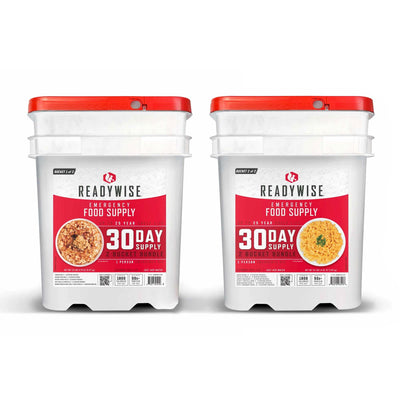Picture this: stranded in the wilderness with no supplies, or trapped indoors as a disaster unfolds outside. In these moments, survival hinges on the essentials—shelter, water, and food. But how long can the human body really survive without food? Emergencies force us to confront the limits of our endurance, making us question just how resilient we are when sustenance becomes a distant hope rather than a certainty.
That said, how long can a person live without food, really? Typically between 8 and 21 days, but it depends.1
That’s why we’re here—to dive into the key factors that impact survival without food, understand why food is crucial for sustaining life, and explore how to be ready when it matters most.
The Science of Survival Without Food
Food is fuel, and the nutrients we consume play critical roles in:
- Energy levels
- Brain function
- Muscle function
- Immune function
During periods of prolonged fasting, the body goes through three main stages:
- Energy from carbohydrates – Initially, the body uses glycogen (stored carbohydrates) for energy. This phase lasts about 12 to 24 hours, depending on activity and glycogen levels.2
- Energy from fat – Once glycogen is depleted, the body shifts to burning fat for fuel, entering a state called ketosis. This can last for days or weeks, providing an alternative energy source.2
- Muscle breakdown – After fat stores are used up, the body starts breaking down muscle for protein to meet energy needs. This stage is dangerous: It leads to muscle loss, weakness, and potential organ damage if prolonged.2
Key Factors Affecting Survival Time
While many people can survive without food for several weeks, the exact duration varies depending on:
- Hydration levels – The human body can only survive an average of three days without water.3 As dehydration sets in, one may experience fatigue, dizziness, and confusion as the body’s fluid levels drop, impairing normal bodily functions and reducing the brain’s ability to think clearly.
- Body composition – Individuals with more fat and muscle on their bodies may have a higher chance of survival, as the body will have more energy stores to pull from in a fasting period.
- Health conditions and age – In a survival situation, older adults with slower metabolisms and individuals with chronic conditions may face heightened risks. Their bodies may struggle more to cope with the lack of food, potentially leading to complications or faster deterioration.
- Environmental conditions – Finding yourself without food in extremely low or high temperatures can put your body at a greater disadvantage, as it uses more energy to maintain body temperature. Navigating uneven or steep terrain can also drain your energy reserves more quickly.
The Physical and Mental Effects of Starvation
Living for days, or even weeks, without food can put a significant strain on the body. Physiologically, those experiencing prolonged food deprivation may experience4:
- Weakness
- Constipation
- Diarrhea
- Cold hands and feet
- Heart palpitations
- Low blood pressure
- Dry skin and hair
- Immune system suppression
It can take a mental toll, too, causing cognitive decline that may manifest as:
- Confusion
- Irritability
- Anxiety
- Depression
Typically, this type of hunger-induced emotional strain will often intensify with prolonged starvation, impacting mental well-being and decision-making.
Why Preparedness Matters
While it’s true that people can survive without food for weeks, the experience is far from easy. The physical and mental toll of prolonged hunger is grueling—fatigue sets in, muscles weaken, and clarity of thought diminishes.
The body becomes a battleground, struggling to hold on while the mind frays under the stress. It’s an exhausting ordeal, and the longer it lasts, the harder it becomes to stay focused and alert.
This is where preparation—in the form of a long term food supply—becomes not just important, but essential.
Being prepared with enough food, water, and supplies can prevent you from having to endure the extreme hardship of fasting in an emergency situation. By planning ahead and understanding your needs—whether through packing emergency rations, stockpiling canned food, or having a solid strategy for shelter and hydration—you take control of your survival.
ReadyWise: A Reliable Partner in Emergency Preparedness
For long-lasting emergency food supplies, you need high-quality rations that are nutritious and readily available. ReadyWise is a trusted provider of long-lasting emergency food supplies designed to support individuals and families in emergencies.
We focus on providing nutrient-rich, easy-to-store meals that offer peace of mind when food access is uncertain. Our starter kits are not only compact and convenient but also require minimal preparation—perfect for when every moment counts.
Survival Hinges on Preparedness
Finding yourself without food or water can quickly turn a challenging situation into a life-or-death struggle. Your individual health, hydration levels, environmental conditions, and physical demands all play a critical role in your chances of survival.
Planning ahead can make all the difference in preventing unnecessary hardship. By being prepared with reliable food sources, water, and emergency kits, you’re not just surviving—you're setting yourself up for success in the face of uncertainty.
Explore ReadyWise’s emergency food options to ensure you’re ready for anything life throws your way. With nutrient-rich, easy-to-store meals that require minimal preparation, you’ll have the peace of mind knowing you're equipped to handle whatever comes next.
Sources:
- Healthline. How Long Can You Live Without Food? https://www.healthline.com/health/food-nutrition/how-long-can-you-live-without-food
- Disease Markers. The Effect of Fasting on Human Metabolism and Psychological Health. https://pmc.ncbi.nlm.nih.gov/articles/PMC8754590/
- Medical News Today. How long you can live without water. https://www.medicalnewstoday.com/articles/325174
- NHS. Physical & Psychological Side-Effects Of The Starvation Syndrome. https://www.nhsgrampian.org/service-hub/eating-disorder-mcn/patients--carers/anorexia---further-information/physical--psychological-effects-of-starvation/


















































































